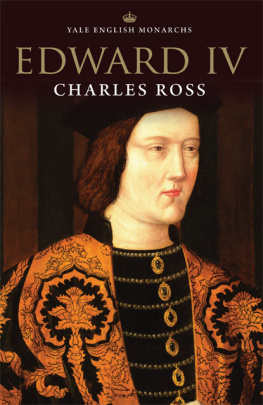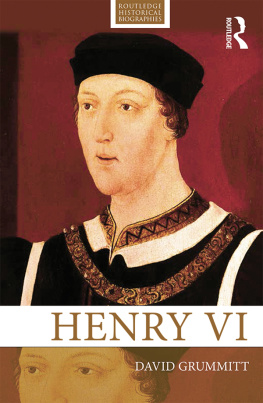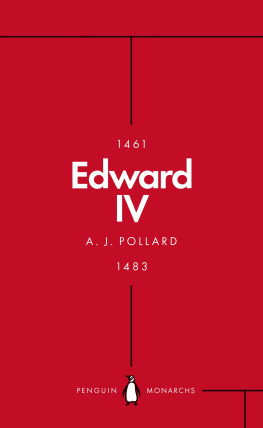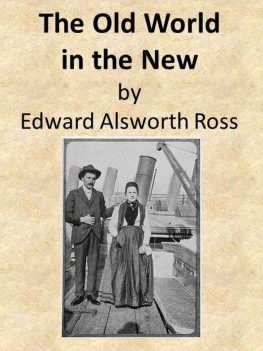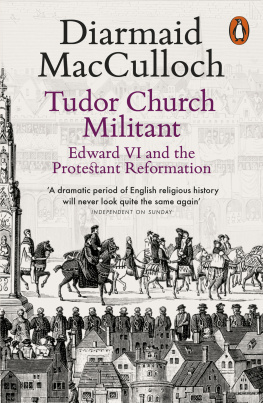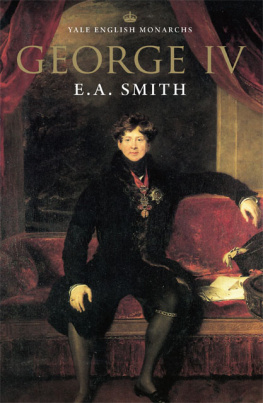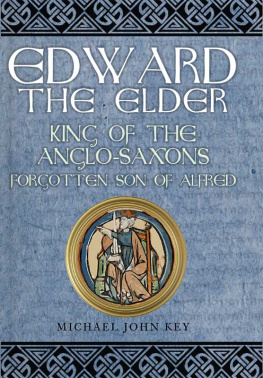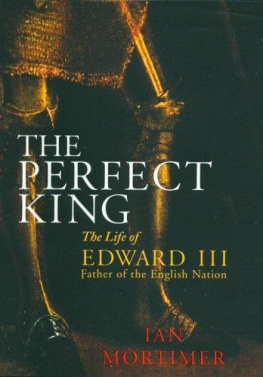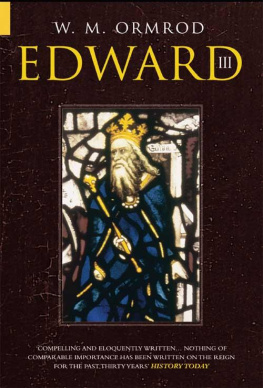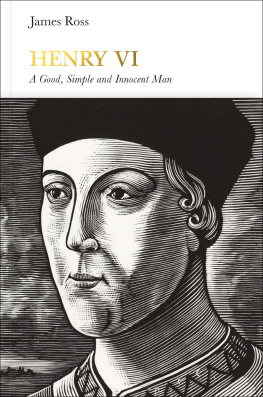
Also in the Yale English Monarchs Series
ATHELSTAN by Sarah Foot
EDWARD THE CONFESSOR by Frank Barlow
WILLIAM THE CONQUEROR by David Douglas
WILLIAM RUFUS by Frank Barlow
HENRY I by Warren Hollister
KING STEPHEN by Edmund King
HENRY II by W. L. Warren*
RICHARD I by John Gillingham
KING JOHN by W. L. Warren*
EDWARD I by Michael Prestwich
EDWARD II by Seymour Phillips
RICHARD II by Nigel Saul
HENRY V by Christopher Allmand
HENRY VI by Bertram Wolffe
EDWARD IV by Charles Ross
RICHARD III by Charles Ross
HENRY VII by S. B. Chrimes
HENRY VIII by J. J. Scarisbrick
EDWARD VI by Jennifer Loach
MARY I by John Edwards
JAMES II by John Miller
QUEEN ANNE by Edward Gregg
GEORGE I by Ragnhild Hatton
GEORGE II by Andrew C. Thompson
GEORGE III by Jeremy Black
GEORGE IV by E. A. Smith
Available in the U.S. from University of California Press

First published in Great Britain in 1974 by Eyre Methuen Ltd
First published in paperback in 1983 by Methuen London Ltd
This edition first published by Yale University Press in 1997
Copyright 1974 Charles Ross
New edition 1997 The Estate of Charles Ross
New Foreword 1997 R. A. Griffiths
All rights reserved. This book may not be reproduced in whole or in part, in any form (beyond that copying permitted by Sections 107 and 108 of the U.S. Copyright Law and except by reveiwers for the public press), without written permission from the publishers.
Printed in Great Britain by Berforts Group
Library of Congress Catalog Card Number 97-61404
ISBN 0-300-07371-2 (hbk.)
ISBN 978-0-300-07372-0 (pbk.)
A catalogue record for this book is available from the British Library.
5 7 9 10 8 6 4
CONTENTS
(i) Disorder, Disaffection and Pacification
(ii) The Lancastrian Resistance, 14611464
(i) Warwicks Challenge and Failure, 14691470
(ii) Edwards Deposition and Exile
(iii) The Recovery of England, March-May 1471
(i) The Settlement of 1471: Rewards and Punishments
(ii) The Quarrel of Clarence and Gloucester, 14711475
(iii) Policies towards Wales, the north of England, and Ireland
(i) Diplomacy and the Formation of Alliances: the Approach to War
(ii) Financial and Military Preparations
(iii) The Invasion of France, 1475
(i) The Fall of Clarence
(ii) Marriage Politics and Diplomacy
(iii) England, France and Burgundy
(i) Relations with the Nobility
(ii) The King and the Commons in Parliament
(iii) Merchants and Commercial Policy
ILLUSTRATIONS
MAPS
DIAGRAMS
Diagrams 14 were re-drawn from the authors roughs by Edgar Holloway.
FOREWORD TO THE YALE EDITION
by R. A. Griffiths
Charles Ross died in 1986. Among those of this writings intended for a wide reading public as well as the professional historian, Edward IV (1974) is the finest achievement. The Wars of the Roses (1976) and Richard III (1981) are also highly successful and deservedly popular studies, and together the three volumes display the authors masterly understanding of Yorkist England and the relationship between king and realm in an age of dynastic civil war.
This is remarkable, for since 1974 the fifteenth century has continued to attract attention from a generation of scholars, many of whom have been inspired personally by Charles Ross or by his writings. Editions of original sources have appeared, and a torrent of books and essays has been published on many aspects of Yorkist England. A substantial proportion of these were part of the frenzied concentration on the quincentenary of Richard IIIs usurpation in 1483 and his defeat at Bosworth Field two years later, yet most could not fail to illumine Edwards reign as well, and Yorkist England more generally. In large part these writers filled lacunae in Edward IV, or substantiated Rosss conclusions in detail, rather than significantly altered them. This is a tribute to the original text of Edward IV and to Rosss perspicacity as a historian of the fifteenth century.
Edward IV is based carefully on an interpretation of those original mostly contemporary narrative and administrative sources available in 1974. No major narrative source has come to light since then, although a few newly-published contemporary fragments shed light on some aspects of the reign.English and foreign writers who commented on the Wars of the Roses.
New editions of chronicles and other sources, and reprints of older ones, reflect continuing interest in this period and a demand that classic texts be more widely available than in dusty, Victorian editions: for example, John Warkworths brief chronicle, which is valuable for the crisis years of 14701, the Chronicle of the Rebellion in Lincolnshire in 1470, and the propagandist Historie of the Arrivall of Edward IV in 1471.
Of cardinal significance is the new edition of the Crowland Chronicle, published in 1986. In constructing his picture of Edward IV and the politics of the reign, Ross attached great importance to the anonymous political memoir that lies at the heart of the so-called second continuation of this chronicle: by far the most important single source for the years 147185. Whilst authorship and date of compilation pose interesting historical questions, all the protagonists agree with Ross that the author was a close observer of Edward IV, with access to the corridors of his court and government, and that his memoir is a first-rate source for the reign.
Ross was critical of the young Edward as he struggled to secure his grip on the realm after 1461. In particular, he felt that the king was unduly lenient towards his foes in northern England. The unreconciled Lancastrians dominated the north and its castles, yet Edward initially offered pardon to Lancastrian sympathisers who accepted the new regime; and he allowed them to retain positions of trust which they soon abused. With justification, more than one writer considers Ross to have been too hasty in condemning the new king and underestimating the strength of Lancastrian loyalties and the threat they posed so long as Henry VI, Queen Margaret and their son were at large. Edwards attitude to the north, and his early return southwards, may be more comprehensible in the circumstances than Ross allowed.
Detailed study of the celebrated trial for treason of Sir Thomas Cook, an influential London merchant, in 1468 has also modified Rosss judgement of the king. Rather than colluding with the supposed political intrigues of his wifes relatives, the Woodvilles, against Cook, Edward seems genuinely to have believed the charges against him and felt that action was necessary at a time of Lancastrian and other plots. If the kings treatment of Cook is to be judged at all misconceived, it must be because of Edwards later generosity towards him, despite condemnation for misprision of treason.
Ross did not see Edward as a great warrior-king: on occasion, the king lacked strategic judgement and decisiveness, and during the rebellions of 146970 he made mistakes. This latter verdict partly hinges on Edwards unwillingness to accept that Clarence and Warwick were behind the Lincolnshire disturbances in March 1470. Yet there remain doubts about the extent of their implication, and Edward, by his propaganda and military campaign, may have magnified their overt treason for his own purposes.
Next page
